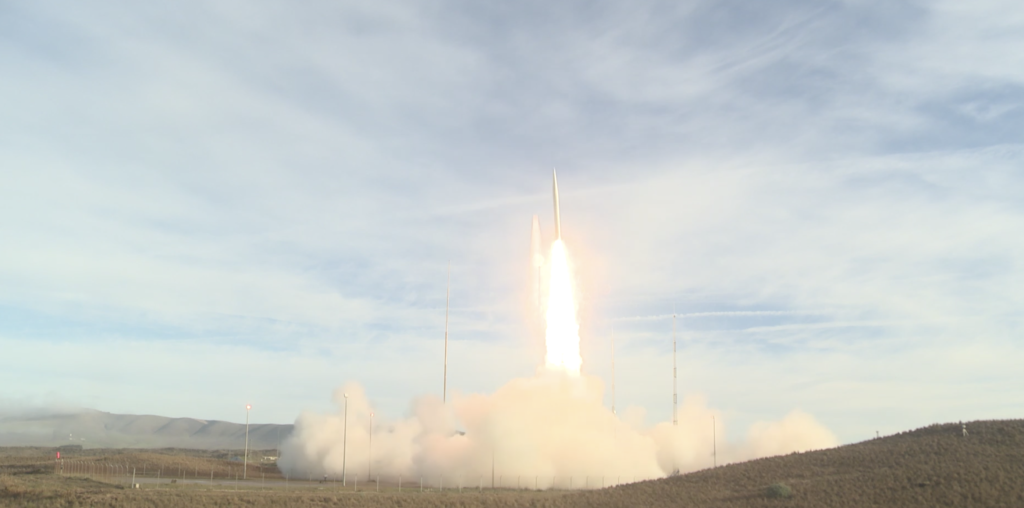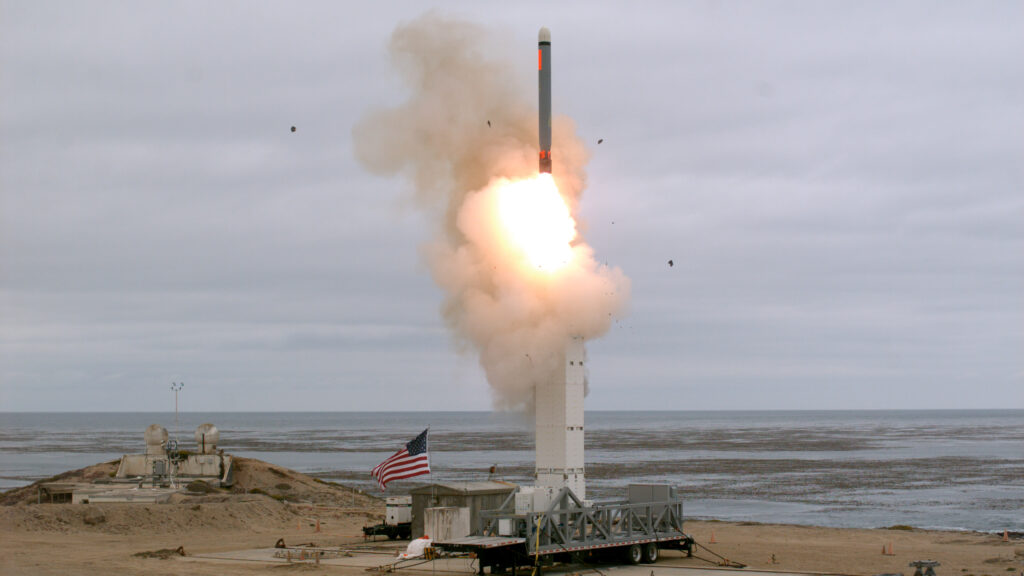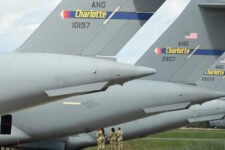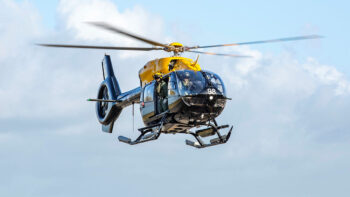
Launch of INF busting ballistic missile from Vandenberg AFB Dec. 12 2019
WASHINGTON: In a clear signal to Moscow, Beijing, and Pyongyang this morning, the Pentagon again showed it plans to leave the INF treaty behind by launching a prototype ballistic missile that blew past the old pact’s range limits.
In the second test of its kind since the US pulled out of the Intermediate-Range Nuclear Forces treaty in August, the prototype ballistic missile flew more than 500km before crashing into the ocean, as planned, while “data collected and lessons learned from this test will inform the Department of Defense’s development of future intermediate-range capabilities,” Pentagon spokesman Lt. Col. Robert Carver said in a statement.
In a previous test conducted just two weeks after withdrawing from the treaty, the Navy launched a Tomahawk Land Attack Cruise Missile from an island off the California coast, marking the first time a missile breached the 500-5,000km range barred by the treaty, putting competitors on notice that the US was ready to push ahead quickly.
Both tests were run in partnership with the Strategic Capabilities Office.
In it’s 2020 budget request, the Pentagon asked for $96 million to continue research and begin testing ground-launched missiles that break the INF’s previously restrictive bounds. But any plans to buy one of these missiles in the near-term at least appears to be on hold until Capitol Hill understands the Pentagon’s plans a little better.

The US tested a cruise missile that would have exceeded the limits of the INF treaty.
Congress blocked spending any fiscal 2020 funds on buying or fielding intermediate-range ballistic or cruise missiles. The prohibition is included in the 2020 National Defense Authorization Act agreed to Monday, just hours before the Army tested one of the competitors in it’s competition for a next-generation long-range missile. That does not bar prototypes or other research ands development work. The Pentagon can keep working on them for the next year, but must submit a report to Congress with an Analysis of Alternatives for a future INF-busting missile.
Lawmakers also want more information on potential basing options in Europe and a rundown of what conversations the Pentagon has had with allies about plans for basing and deployment locations in the future.
Asked about possible deployments of the new missiles during a visit by the Czech defense minister to the Pentagon today, Defense Secretary Mark Esper said, “once we develop intermediate-range missiles and if my commanders require them, then we will work closely and consult closely with our allies in Europe, Asia, and elsewhere with regards to any possible deployments.”
As far as what kind of missile was fired today, Kingston Reif of the Arms Control Association said “it was probably some kind of Frankenstein using existing boosters and components. Of particular interest is whether it used anything from the Missile Defense Agency, especially given Russia’s claims that certain US missile defense programs violated the treaty.”
Reif called the test “more significant” than August’s Tomahawk launch since a ground-launched intermediate-range ballistic missile “could promptly strike deep into Russia, China, and North Korea.” That, of course, is exactly the capability the Pentagon wants.
The NDAA sends the message that Congress wants answers to questions about the rationale and concept of operations for the missiles, not least of which is what allies would be willing to host such missiles. While the chairman of the HASC, Adam Smith, is a proponent of arms control, that is not true of his Senate counterpart, Sen. Jim Inhofe, and the NDAA language is a clear compromise that leaves the military considerable room for maneuver.
At Vandenberg, the 30th Space Wing worked with the SCO on the new missile’s launch preparations and data collection, and has been working on post-INF launches since the US suspended its participation in the treaty in February.
“The National Defense Strategy provides very clear direction to restore our competitive edge in the reemergence of great power competition,” 30th commander Col. Anthony Mastalir said in a statement. “We owe it to our nation to rapidly evolve and develop our capacity to defend.”
Major trends and takeaways from the Defense Department’s Unfunded Priority Lists
Mark Cancian and Chris Park of CSIS break down what is in this year’s unfunded priority lists and what they say about the state of the US military.


























